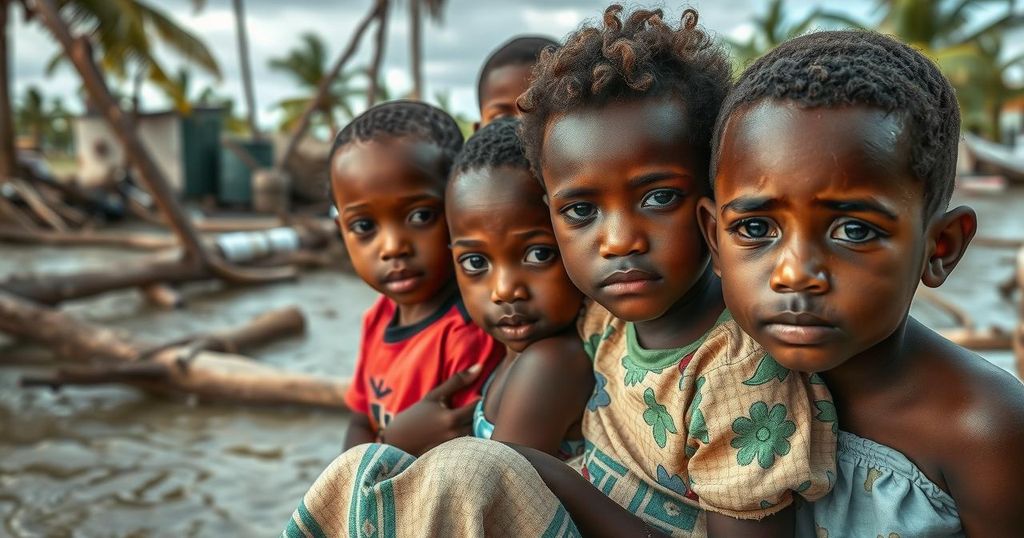Cyclone Chido Strikes Northern Mozambique, Affecting Thousands of Children
Tropical Cyclone Chido struck northern Mozambique, impacting over 90,000 children and destroying thousands of homes and classrooms. Already facing numerous crises, the region’s situation worsens as aid agencies respond to the growing humanitarian need amid fears of escalating disease outbreaks.
Tropical Cyclone Chido recently impacted northern Mozambique, severely affecting the Cabo Delgado province. The cyclone resulted in the destruction or damage of over 35,000 homes, displacing thousands of families, with at least 90,000 children suffering the consequences. The United Nations Children’s Fund (UNICEF) reported that 174,000 individuals have been affected overall, with at least 186,000 classrooms destroyed and damages to 20 healthcare facilities after the storm struck near Pemba, Cabo Delgado, causing extensive devastation.
The effects of Cyclone Chido come at a time when Mozambique is already grappling with challenging circumstances, including climate change impacts that have left children vulnerable to various emergencies such as conflict, drought, and disease outbreaks. Mary Louise Eagleton, UNICEF Representative in Mozambique, emphasized the prior adversities faced by children before the cyclone and noted ongoing humanitarian efforts despite the overwhelming challenges.
Cabo Delgado has been enduring a brutal conflict for seven years, displacing over 1.3 million people, mostly women and children, and leaving them in dire conditions. Cyclone Chido has exacerbated these hardships, washing away previous efforts of reconstruction. The cyclone wreaked further havoc across Nampula and Niassa provinces, affecting over 25,000 families, damaging essential utilities, and raising concerns about a worsening cholera outbreak.
In the immediate wake of the cyclone, the UN Refugee Agency (UNHCR) provided relief supplies to more than 2,600 individuals in Pemba. The organization reported that numerous homes and schools have been severely impacted in rural areas, with preliminary assessments indicating that approximately 190,000 people urgently require humanitarian assistance. UN Secretary-General António Guterres reiterated the UN’s commitment to assist during the crisis, although limited supplies are hindering the response efforts. Emergency Relief Coordinator Tom Fletcher allocated $4 million for the rapid humanitarian response.
The repercussions of Cyclone Chido were not limited to Mozambique. The cyclone also heavily affected Mayotte, a French overseas territory, along with southern Malawi, leading to significant destruction of infrastructure and escalating vulnerabilities among displaced populations in these regions. The World Food Programme (WFP) is enhancing its efforts to support those most impacted by the cyclone, with projections indicating a looming food insecurity crisis for nearly 3.3 million people in Mozambique in the coming year.
Cyclone Chido had a profound impact on northern Mozambique, which is one of the most climate-affected regions in the world. The storm exacerbated already existing humanitarian crises in Cabo Delgado, where conflict, drought, and health emergencies have severely affected the local population, particularly children. As international agencies coordinate assistance efforts, the need for humanitarian aid remains critical in light of the extensive damage caused by the cyclone and the ongoing struggles faced by the inhabitants.
In summary, Cyclone Chido has inflicted significant harm on northern Mozambique, predominantly affecting the Cabo Delgado province and its vulnerable populations, particularly children. Relief efforts are underway, but the challenges are considerable, given the pre-existing crises of conflict and climate change that have historically impacted this region. Continued support and urgent humanitarian assistance are essential for recovery and rebuilding efforts in the wake of this devastating disaster.
Original Source: news.un.org




Post Comment